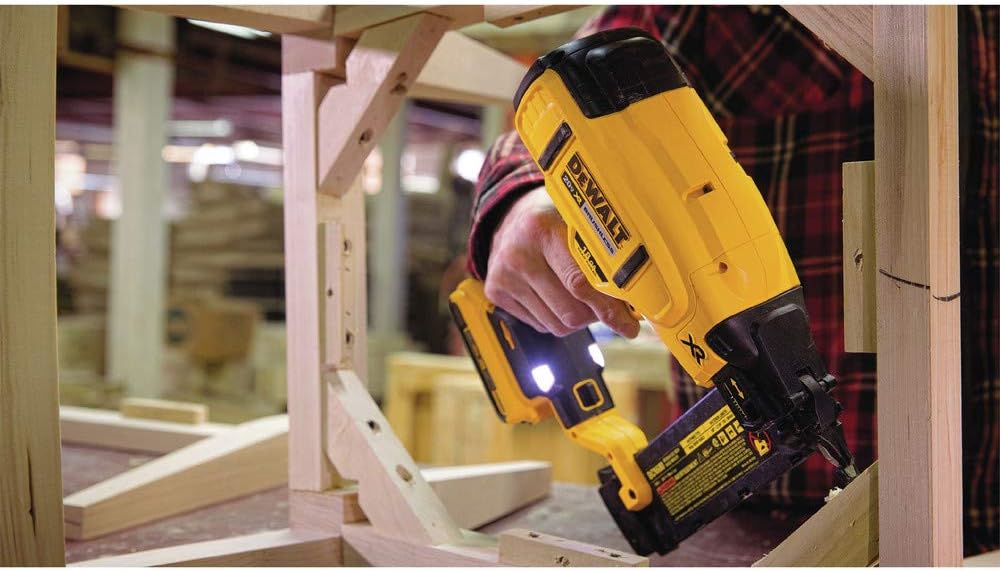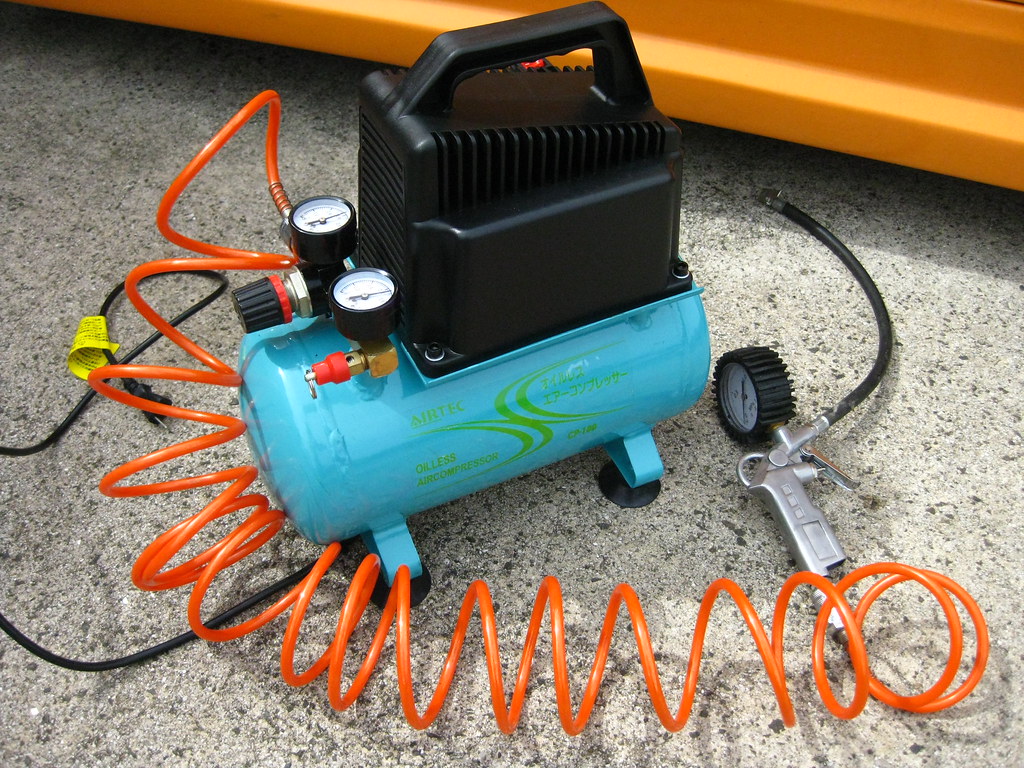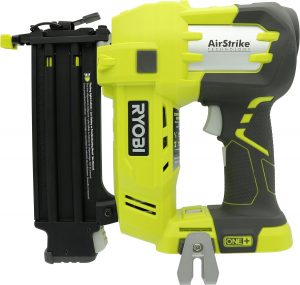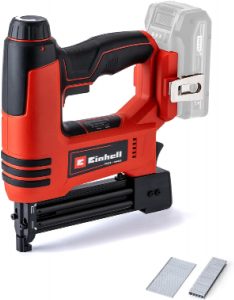To nail gun or not to nail gun that is the question (in many DIYers minds)! And I’ve been there during our renovation over the last 4 years. When I started out with renovation & DIY budget was a big consideration and I didn’t even own a screwdriver (I mean everyone owns a screwdriver don’t they) so the thought of having to spend 100s if not 1000s of pounds on new tools was scary and I always considered a nail gun as a luxury tool rather than an essential tool, that was until I got one!!
I still hammer and love to hammer but for general use and finishing I’d go as far to say that a nail is almost essential for any DIYer or anyone undertaking a renovation.

In my experience, the main challenge when it comes to selecting the best nail gun for DIY is the wide array of types, prices and brands on the market so in this post I’ll run you through my experience of nail guns and the points to consider when buying one.
Nail Gun Uses
Alright, maybe we are jumping the gun here (ha) so before I get into the nitty gritty of budget nail guns on the market, let me shed light on some their main uses.
Framing
One of the common uses of a nail gun primarily on construction sites is for framing jobs because of precision and speed (at it looks pretty cool doesn’t it). For first-time DIYers however I’d massively recommend against framing with a nail gun and to use a screw driver instead since unless you drive you’re screws in too far (been there, done that) it far easier to unscrew something than it is to pull out longer framing nails if you make a mistake.
Flooring
A floor nailer is a special type of nail gun used just for nailing flooring down, it has an angled support to nails are fired into the flooring on a diagonal normally in a tongue and groove joint to hold a floorboard in place but also hiding the nails within the tongue and groove. While these can give a great finish with no visible nails for me I’ve simply never had a need to own or use one mainly because all our floor boards are about 5cm thick!
Hobby
You can buy small, simple, less powerful hobby nail guns for use with arts and craft or basic upholstery but don’t expect these less powerful nail guns to handle any sort of DIY!
General purpose / Finishing
For non-structural work like ceilings, wall trim and finer finishing jobs (or just to hold a piece of wood in place temporarily while you screw it in) then a general purpose or finishing nail gun is the way to go especially if you’re working overhead on for example a ceiling where it borderline impossible to hammer in nails manually. I’ve used 2 different general purpose nail guns for ceilings in our house and I actually don’t know how I would have managed without a nail gun. Main advantage over using a nail gun over screws here is you don’t need to hold a screw in place as the nails are held within the gun so it’s just to line up and fire.
For DIYers I think general purpose nail gun is the only type of nail gun you’d ever need because they are more versatile & not specialised to one specific job like if you were a professional build or framing who frames up walls 10 hours a day, 365 days a year.
With this is mind, in this article I’ll focusing on general purpose nail guns.
Nail Gun Types
Nail guns are pretty simple things with 2 main jobs; firing the nail and loading the next nail. However, there are a few different types of nail gun, all with their own plus and minus points to consider:
Cordless/ Battery Nail Guns
As the name suggests, this type of nail gun operates without a cord so you’re fully mobile which means that you can work without being tethered (or tangled) to an electric cable or needing to be near an electric socket. Instead of direct electricity, they use batteries to power the loading and firing actions.
Nearly all power tool brands have invested heavily in battery and fast charging technology in recent years meaning batteries can last hours (depending on how cold it is) and fast charging means you can recharge in minutes rather than hours. Also the power of battery nail guns is now comparable to pneumatic and corded nail guns so assuming you choose the right type of gun for the job you’re doing then power isn’t an issue.
The flexibility & mobility of battery nail guns makes them an obvious choice, but they are as with most battery power tools also more expensive compared to the corded models and often do not come with a battery or charger included (this drives me crazy!!) so you have to buy them separately. If you do need to buy a separate battery & charger ensure they are compatible with the nail gun and I’d highly recommend going for a “fast charger” instead of a standard charger, fast chargers can charge batteries in minutes rather than hours if you use a standard charger. If your budget allows I’d also recommend getting 2 batteries + a fast charger that way you can charge and keep working at the sametime.
TIP: If you’re just starting out with DIY or renovation, consider buying power tools all from the same brand then you can generally reuse batteries across all your tools and only need a single charger. When I started out I bought tools at random and soon accumulated a large array of batteries and chargers often having to buy new batteries & charger for each power tool!
Another point to consider with battery nail guns is the additional the weight added to the unit from the battery, if you’re only doing small jobs this wouldn’t be a problem but after a whole day of for example overhead work and you will feel it in the morning. This goes for all power tools in general, not just nail guns.
Plus points:
- Mobile & portable with no constrains of needing to be near electricity (apart from charging)
- Great for all-round DIY tasks and often can be loaded with staples as well
- Generally quieter than Pneumatic nail guns
- Any batteries or chargers can be reused if you buy other tools of the same brand
- No cables or hose needed so easy to move around, great for overhead work
Minus points:
- More expensive than other types of nail gun
- The battery can add extra weight
- Often not sold with battery or charger
Pressurised / Pneumatic/ Air Nail Guns
These guns are powered by air pressure and require a compressor to be able to use them. In general pneumatic nail guns provide superior power compared to the other two models, allowing the to be used with thick and tough wood.

However, the real downside is the need for a bulky compressor which in-turn needs electricity to function and while you can get long air hoses it becomes clunky to move them around which for me reduces the convenience.
In terms of cost, the actual gun/trigger part is generally pretty cheap (anything for $50 up) but once you add in the cost of a compressor assuming you don’t already have one and you’re coming up close to the cost of a battery nail gun albeit probably without battery & charger.
Plus points:
- Often provide more power battery or corded nail guns
- No charging time
Minus points:
- Need for compressor & electric makes them hard to move around
- Gun/trigger must be connected to compressor at all times so more clumsy to move around or do overhead work
- Much louder than battery or corded nail guns
Electric / Corded Nail Guns
These nail guns are lighter, simpler, and compact compared to the pneumatic and battery models. However, without stating the obvious you can only use them in an area where there is electricity. If your DIY project is outdoors, especially in an area where it is challenging to get power, in short they’re a no go.
Also in my experience you won’t anywhere close to the power of a modern battery nail gun or pneumatic nail gun.
That said, corded nail guns like all corded power tools are considerably cheaper than battery operated ones and I think it ultimately comes down to budget & what you want to use the nail gun for, if you’re only going to be working inside doing say window trim then a corded nail will get the job done and at a fraction of the cost of battery or pneumatic nail guns.
Plus points:
- No charging time
- Generally less noise when firing
- Generally a lot cheaper than other nail gun types
Minus points:
- Requires constant electricity
- Require electric cable making it harder to move around
- Lower power than battery or pneumatic nail guns
Things to Consider when Buying a Nail Gun
No doubt, selecting a nail gun boils down to usage. How will you be using the nail gun? If you are a DIYer looking forward to completing a specific project fast, the task at hand is all that you need to factor. For example, if you are looking for a nail gun for fencing, a model with sturdy body and capable of shooting thicker nails will come in handy. Having said that, here are the main things to consider when looking for a nail gun:
Nail Length
Nail guns are designed to handle nails of different thicknesses and lengths. Most 15-16-gauge nail guns are designed to work with thick nails of up to 2.5-inch long. However, an 18-gauge gun can shoot nails of a maximum of two inches. So, think about the nails that you will be using and go for the nail gun that can fire them.
A lot of general purpose nail guns can also fire longer staples as well which from my experience can be really useful. I’ve used staples instead of nails to staple up masonite (steamed sheets of wood fibre, no glue) on walls as an under layer for wallpapering.
The Right Type of the Job
You can also use the nature of your job to determine the nail gun to buy. For example, roofing and flooring jobs require heavy-duty nail guns, while finishing tasks can be done with general purpose nail guns.
Price vs Usage
One thing you need to appreciate when looking for a DIY nail gun is that the best models do not come cheap. However, this does not mean that you can’t get a high quality model at an affordable nail gun. To get higher value for money when looking for the best nail gun, it will be a good idea to focus on usage first and finally, the price.
If it’s a tool you’re going to use often in my experience you often end up regretting “going cheap” in the long run but if it’s a tool for a certain or occasional job only you’ll probably get away with a cheaper model just fine. There’s no doubting the well-known brand nail guns are often lighter, more powerful and more durable but in many cases you’re looking at double or triple the price of a lesser-known brand often purely for the name.
Safety
Like other power tools, safety should come first when selecting a nail gun. This is why you should go for the model that is CE marked for your region and protective equipment is essential.
As I mentioned above, all nail guns make noise with pneumatic being the loudest followed by battery & corded nail guns so like with all power tools always always wear hearing protection and never forget the goggles! I’ve cut corners in the past & got lucky!
How to Use a Nail Gun
Again, before you start, get the safety gear on and read the manual first. You might think a nail gun is simple enough to use and in general they are but often different nail guns have different loading mechanisms which if you get wrong can cause misfiring that can be dangerous or even jam or damage the nail gun.
All proper nail guns have a safety mechanism so they can only fire when push with enough pressure against a hard surface so you need to make sure the head of the nail gun is push straight & firmly against the wood then press the trigger, that’s about it.
Most nail guns have some sort of power gauge or switch so you can vary the power at which the nails are fired. I’ve found this useful when working with softer or thinner material like masonite where too much power can result in the nail or staple going straight through the material and not holding.
If you find the process of using the nail gun challenging to start take some scrap wood and practice.
Recommended Nail Guns for DIYers
So after all that which budget nail guns would I recommend for DIYers? Well in my view for a DIYer the best choice of nail gun is a general-purpose battery powered nail gun because they are most versatile and mobile and thus will be more useful for multiple types of jobs!
1) Battery nail gun kit: DEWALT 20V MAX – $280-300

This is a nail gun kit from a big brand which includes a battery & charger (which as I mentioned isn’t standard) and DeWalt is know for it’s durability across it’s whole product range. It has a brushless motor & Lithium Ion battery mean efficient runtime and long battery life.
It can handle brad nails from 5/8-inch to 2-1/8-inch so can suit all your finishing & general-purpose needs.
This is a great budget starter kit for anyone needing a nail gun kit that’s ready to go and has great reviews (4.8 of 5), highly recommended!
2) Battery nail gun: Ryobi P320 Airstrike – $100-120 (without battery)

Very similar to the DEWALT 20V MAX in terms of spec, power & battery life but comes in slightly cheaper even when you add a battery & charger separately which aren’t included (!!!!). I know I said I hate when batteries aren’t included but to be fair to Ryobi (& other brands) their whole marketing is built around needing only 1 type of battery for all their products which is a nice idea & if you already own a Ryobi One+ battery you’re covered. If you don’t a battery & charger will set you back around $60 more meaning this nail gun comes in under $200 which for a product with a 4.6 out of 5 rating over nearly 3000 reviews is pretty amazing value!
3) Battery nail gun: Einhell cordless nail gun TE-CN 18 Li – $80-90 (without battery) – Europe based

If you’re based in Europe, Einhell is a fast growing german brand with very affordable power tools and like Ryobi & other brands allow you to reuse batteries over their whole product range. They do ship in the US as well but with a smaller product range. I own multiple Einhell products including this nail gun so I share the batteries and charger between all products. What impresses me most is the quality and that fact that most their products is 30-40% cheaper than more well-known brands!
This nail gun can fire both 30mm nails and 30mm staples which for me has been really useful to have the option as I mentioned above. Battery life is great and buying the battery & charger on top only set me back around $50, so for around $150 I have a well functioning nail gun which nower days I use all the time.
Super low budget option: If you don’t want to spend over $100s and just have relatively simple finishing needs I got a long way with the Rapid EN330 Electric Nailer in the early days of our renovation and the ceilings & trim I used it to put up are still standings 4 years on! It is corded but it’s very light, has decent power, low noise level and a great budget option at under $100!